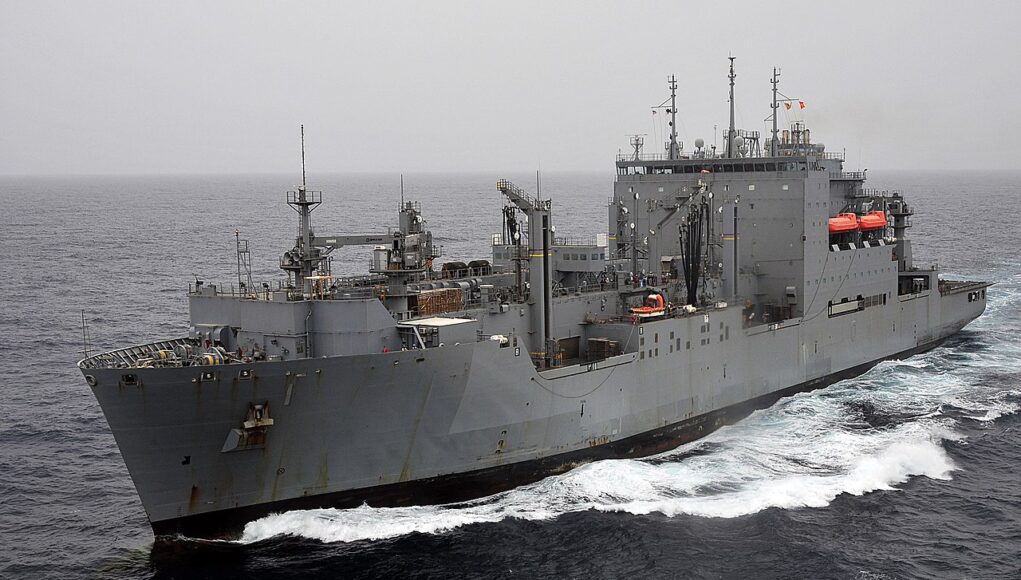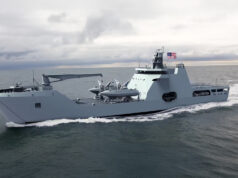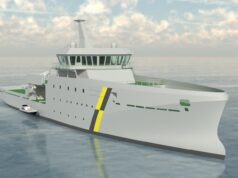The ongoing crewing crisis within the Royal Fleet Auxiliary (RFA) is now echoed across the Atlantic, where the U.S. Navy’s auxiliary fleet faces similar challenges.
This development raises serious concerns about the operational readiness of vital maritime support vessels in both the UK and the US.
In the United States, the Military Sealift Command (MSC) is considering a significant “force generation reset” due to a shortage of qualified mariners.
This plan could see 17 support ships, including replenishment ships, fast transports, and expeditionary sea bases, placed into an “extended maintenance” period. The crews from these vessels would be reassigned to other ships, potentially reducing the demand for civilian mariners by up to 700 positions.
This situation mirrors the difficulties experienced by the RFA, which has been grappling with recruitment issues for over a decade. Despite considerable investment in recruitment, the RFA has repeatedly fallen short of its staffing targets.
As of October 2023, the RFA was still 38 personnel short of its requirement for the year, continuing a trend of missed targets dating back to 2010.
The Ministry of Defence has spent over £2.7 million on recruitment efforts between 2018 and 2024, yet this has not translated into the necessary increase in personnel. In some years, even with reduced spending, recruitment numbers have seen slight improvements, suggesting that financial investment alone is not addressing the root of the problem.
The persistent shortage of personnel has led to a significant portion of the RFA fleet being out of action, unable to fulfil its essential role in supporting the Royal Navy’s global operations.














Supply and demand. Pay them more and I am sure they will come.
This
Where’s the like button? I want a like button for this post only.
Got it in one.
I have a hard time imagining why young people here and in the US would want to sign up. The pay is crap, the hours are torturous, the food and care standards abysmal, and in our brave new beige monoculture world all hint of patriotic fervour has been all but stamped out. Not to mention that younger demographics are increasingly dominated by those with heritages from elsewhere in the world. No surprise the issue of a lack of volunteers is ubiquitous across the West
The pay isn’t crap. The pension is still very good, you get 38 days leave plus more when you have been at sea and despite what you read in the press, accommodation, especially single living accommodation is actually pretty good.
The conditions are not acceptable for a 21st century work environment. Being away from home for months on end isn’t a sustainable lifestyle. How do you expect these people to meet partners and start families? There has to be another way, this 18th century crewing model isn’t working anymore.
Don’t join the Navy then. No-one is being forced to join up. And it can still be a very enjoyable sbd rewarding career. I have friends who have done 22+ years and still love it.
People aren’t. That’s the entire problem. Western societies are running out of people willing to do this.
I’m talking about the RN, which I served for 14 years. You must still have enjoyed it, Chris, to do 30 years. That’s some cracking sea time 👍
Conditions are getting better but there has to be better Wi-Fi access and pay needs addressing rapidly otherwise those who would like a career at sea will do it in cruise ships or vessels working around the coast.
USNS and RFA crews rotate in and out frequently.
USNS crews can and do get billeted in 5-star hotels during maint periods where they cannot live onboard due to ongoing work. You would not be surprised to find that every maint period they always find a job that means they need to move off!
Having served in the RFA for 30 years not sure where you get your information?????
Surely only the UK has such problems 😀
Linked to this, NL has just published an update on RFA vessel availability and crewing. It is not happy reading. 🙁
I agree, we have an end in sight to the SSN and Surface combatant shortages but the RFA is totally f**ked as a concept and the RN wants to rely on it more and more while paying less and less.
Full on warships roles like MCM and Amphibious assault are expect to be done by the RFA now and there are less and less British people in merchant marines every year.
Something has to give.
Oh what bloody mess ,Time for a drink 🍺
Yeh, I read that as well. Grim.
One faint, and I mean faint, glimmer of hope was that discussions on pay whilst on-going where positive… Whatever that means.
RFA status needs looking at. I proposed on another recent thread that they should not be considered civil servants as they are taking on very active roles and do go into ‘harms’ way with increasing frequency. Changing their status would decouple them from the rest of the civil service and remove the argument that paying them more would lead to demands from other civil servants. They are merchant sailors with a paramilitary element to their role which is rather more dangerous, so away from for long periods and in dangerous waters from time to time. RFA crews deserve better.
Cheers CR
Excellent news for Chinese ambitions to attack Taiwan.
Give me a gun and I will defend my family and my home, but as for the country..let those who land in Dover defend it..
Could well be that’s who you will be defending it against in the near future😡
Does George Allison really think that £2.7m over 6 years is a lot of money to spend on recruitment…?
Face it we are running out of people willing to serve in the armed forces, the Police, the NHS, the list is endless I am afraid. The desire for an easy life and of course still to be paid for it is beginning overwhelm all Western nations but we seem to be leading the way with people for whom commuting is unbearable let alone sailing the oceans.
Dont compare USNS crew to RFA crew.
Its chalk and cheese.
USNS crews are civilian to the core.
They don’t wear uniform onboard.
They could not take on half of what the RFA do.
And yes the RFA should be on a special pay spine comparable to the RN and not thrown in with civil servants.
Do you remember ‘the good old days’ when the RFA came under the banner of the (now defunct) RNSTS, when pay and conditions were comparable to the best pay and conditions in the BRITISH Merchant Service – that is, before many famous British companies cut manning costs by moving from the Red Duster to FOC? The Treasury, or rather the RFA, mastered the knack of back-door pay increases for ‘productivity’ that helped pay to remain at levels sufficient to attract eligible seafarers.
Personally, I left because of the creeping militarisation of the service: I was a ship’s Engineer, not a Gunnery Officer!